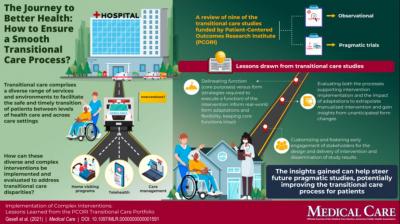Special PCORI supplement to Medical Care reports on ‘Future Directions in Transitional Care Research’

Credit: Gesell et al. (2021), Medical Care, DOI: 10.1097/MLR.0000000000001591
July 12, 2021 – Transitions between healthcare sites – such as from the hospital to home or to a skilled nursing facility – carry known risks to patient safety. Many programs have attempted to improve continuity of care during transitions, but it remains difficult to establish and compare the benefits of these complex interventions. An update on patient-centered approaches to transitional care research and implementation is presented in a supplement to the August issue of Medical Care, sponsored by the Patient-Centered Outcomes Research Institute (PCORI). Medical Care is published in the Lippincott portfolio by Wolters Kluwer.
Titled Future Directions in Transitional Care Research, the special issue “focus[es] on opportunities and challenges involved in conducting patient-centered clinical comparative effectiveness research in transitional care,” according to an introductory editorial by Carly Parry, PhD, MSW, of PCORI and co-authors. The supplement papers present an overview and update on early findings from PCORI’s transitional care research portfolio.
Update on research ‘toward a more holistic understanding of transitional care’
Recognizing the high risks and increased costs associated with care transitions has led to new research on interventions to enhance communication and continuity of care. However, new evidence has not always translated into meaningful improvement in the outcomes most important to patients. For this reason, in addition to important outcomes like hospital readmission rates, PCORI has supported research on patient-centered outcomes such as quality of life, caregiver burden, and healthcare decision-making.
A particular challenge is comparing results between studies, or identifying the most important aspects of these multi-component interventions. Providing evidence about the comparative effectiveness of interventions to improve decision making is a key goal of PCORI’s investment in transitional care. The supplement presents findings from 11 of the 30 PCORI-funded transitional care studies, representing a wide range of health conditions, healthcare settings, patient characteristics, and patient outcomes.
A paper by Sabina B. Gesell, PhD, of Wake Forest School of Medicine and colleagues highlights the findings and implications of the PCORI transitional care portfolio so far. In discussions with researchers from nine studies, the authors identify three key themes:
- Delineating the function versus form of transitional care interventions. While “function” refers to the core purposes of the intervention, “form” refers to the strategies and activities needed to carry out its function. It is critical to distinguish functions from forms. A pragmatic approach would allow for “flexible options for delivery while maintaining appropriate fidelity to the intervention.”
- Evaluating the process supporting implementation and the impact of interventions. Understanding the processes involved in program adaptations – planned and unplanned – is essential to assessing their actual effects, intended or unintended.
- Engaging stakeholders in the design and delivery of interventions. A key aspect of the PCORI approach is engaging stakeholders – including patients, healthcare providers, and advocacy groups or policymakers – in the design and delivery of interventions. Partnering with stakeholders is critical for ensuring that appropriate interventions are designed and successfully disseminated, especially interventions that involve system change. Stakeholders can also play a key role in disseminating the research findings to broader audiences.
The introduction includes an overview of PCORI’s Transitional Care Evidence to Action Network: a learning community designed to promote collaboration among researchers and stakeholders, and thus to enhance the collective impact of the new research PCORI has funded on patient-centered transitional care interventions.
“The papers in this Special Issue articulate challenges and lessons learned, and identify new directions for measurement, patient and stakeholder engagement, implementation, and methodological approaches that reflect the complexity of transitional care research,” Dr. Parry and coauthors conclude. “They also move us toward a more holistic understanding of transitional care that integrates social needs and lifespan developmental transitions into our approaches to improving transitional care.”
Click here to read “Implementation of Complex Interventions: Lessons Learned From the Patient-Centered Outcomes Research Institute Transitional Care Portfolio.”
DOI: 10.1097/MLR.0000000000001591
Click here to read “Patient-Centered Approaches to Transitional Care Research and Implementation: Overview and Insights From Patient-Centered Outcomes Research Institute’s Transitional Care Portfolio.”
DOI: 10.1097/MLR.0000000000001593
###
About Medical Care
Rated as one of the top ten journals in health care administration, Medical Care is devoted to all aspects of the administration and delivery of health care. This scholarly journal publishes original, peer-reviewed papers documenting the most current developments in the rapidly changing field of health care. Medical Care provides timely reports on the findings of original investigations into issues related to the research, planning, organization, financing, provision, and evaluation of health services. In addition, numerous special supplementary issues that focus on specialized topics are produced with each volume. Medical Care is the official journal of the Medical Care Section of the American Public Health Association.
About Wolters Kluwer
Wolters Kluwer (WKL) is a global leader in professional information, software solutions, and services for the clinicians, nurses, accountants, lawyers, and tax, finance, audit, risk, compliance, and regulatory sectors. We help our customers make critical decisions every day by providing expert solutions that combine deep domain knowledge with advanced technology and services.
Wolters Kluwer reported 2020 annual revenues of €4.6 billion. The group serves customers in over 180 countries, maintains operations in over 40 countries, and employs approximately 19,200 people worldwide. The company is headquartered in Alphen aan den Rijn, the Netherlands.
Wolters Kluwer provides trusted clinical technology and evidence-based solutions that engage clinicians, patients, researchers and students in effective decision-making and outcomes across healthcare. We support clinical effectiveness, learning and research, clinical surveillance and compliance, as well as data solutions. For more information about our solutions, visit https:/
For more information, visit http://www.
Media Contact
Emma Goodson
[email protected]




